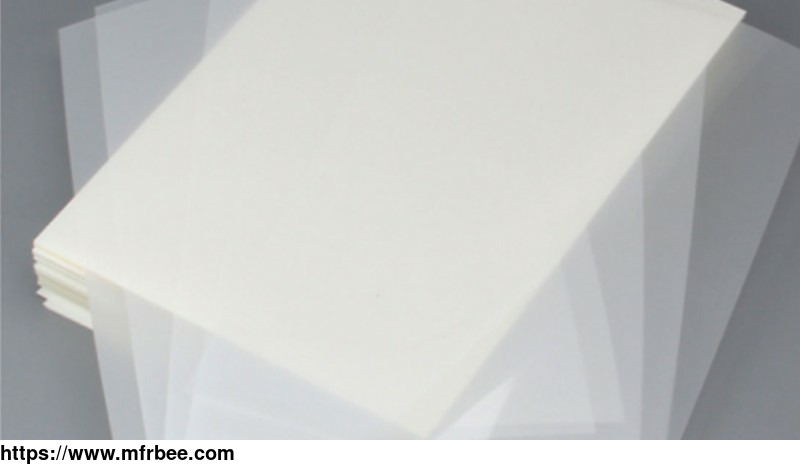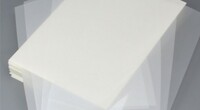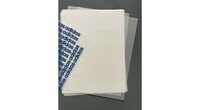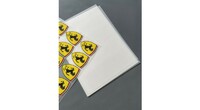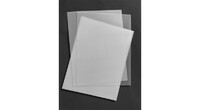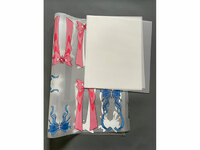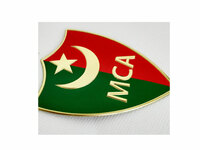DTF (Direct to Film)
Specifications
DTF (Direct to transfer film) is a new technology. DTF printer, DTF ink, DTF powder, and heat press are necessary for the DTF printing process. It is maximum to save the time and cost for users
compared with DTG, laser toner, or screen printing. Classified by the finished effect, there are matte or glossy two types. Based on peel time, our DTF transfer films can be cold peel, warm peel,
or hot peel as your preference. Thickness is mainly in 75micron or 100micron. Various DTF film sheets or DTF film rolls size cutting as customers request.
DTF transfer films are good performance in dimensional stability for heating processing. As one of the most excellent heat transfer film manufacturers in China, we are committed to developing
high-quality formulation before we push out the DTF film to the market. It can be said our unique formula is the key to success.
What Is DTF In Printing?
DTF printing is a new process for decorating garments. It is an alternative printing process for DTG. Using water-based ink to print on the DTF transfer film, pass through the heating tunnel to
dry, sprinkle the DTF powder on the backside, and then heat curing. One of the advantages of DTF printing is that no need to do pre-treatment. After heat pressing, the images are transferred to the
garment in 10 to 15 seconds. Transfer carrier widely in cotton fabrics, polyester, cotton-polyester blended, rayon, nylon, silk, leather, and more fabrics.
Another advantage of the DTF printing process is the low investment cost, which is suitable for small batch production. The appearance of DTF transfer film is of great significance to the field of
the printing industry. It's a supplement to screen printing, white toner printing, and DTG printing. Our 60 cm and 30 cm width roll DTF transfer films are mainly used in Epson double XP600,4720
and I 3200 2 heads or 4 heads DTP printers. A3 and A3+ sheet DTF transfer films are mainly used in desktop printers such as Epson L1800.
High-quality water-based DTF ink and DTF powder ensure a soft hand and good color fastness and washing resistance. DTF printing is suitable for sportswear, jerseys, cycling wear, and work clothes
printing.
Some Things You Need Known To Do The DTF Printing
High-quality equipment is essential. You must invest in high-quality DTF transfer film printers and heat presses to get the best results.
High-quality DTF ink is also needed to ensure the print head will not be clogged. A good DTF ink has high color density and saturation, excellent performance, and durability.
Good stable quality DTF transfer film, not every type of PET transfer film is suitable for the DTF printing process. Our double-sided cold and hot DTF film have more advanced performance, and some
of the lower quality untreated films in the market may not peel clearly and are hard to stick the adhesives or damage your clothes. Our DTF transfer film has been specially processed, which is not
only withstands the high temperature and pressure of hot pressing, but also compatible with all desktop and large format printers. This film can be cut into sheets or rolls for different
operations.
High-quality adhesive to help the image sticky to the fabric well. Our DTF transfer powder is durable and has passed through 60 times hand washes tests while keeping a soft touch. The DTF powder is
not peculiar smell, and the excess can be stored and reused.
Some Things You Need Known To Do The DTF Printing
DTF Direct to Film Printing Process
Heat press process:
Preheat clothes to remove excess moisture
Temperature: 325 F
Time: 10-15 seconds
Pressure: Medium to heavy Pressure
Peel: Wait for 10 seconds and peel hot.
After peeling press again for 5-10 seconds without a cover sheet to cure the shirt
Wait 24 hours before washing or stretching
If printing thick and coarse-grained fabric or small letters, please press 5 to 10 seconds more using heavy pressure. If your transfer is trying to lift up while removing the transparent film, make
sure to cool completely before attempting to remove it! Otherwise, you may need to increase 10 degrees or increase the press time by more than 5 seconds. Sometimes to completely cure the shirt, you
have to press again for 10 seconds.
DTF Direct to Film Printing Process
Questions and Answers About DTF
Which is Better DTF or DTG
DTF (Direct to Film) and DTG (Direct to Garment) are both digital printing methods used in the garment industry, but they have some differences in terms of the process, quality, and cost.
DTF involves printing designs directly onto a specialized film, which is then heat-pressed onto the garment. This method is faster than DTG and allows for printing on a wider range of fabrics,
including dark and colored garments. However, the films used in DTF can be expensive, and the DTF transfer process can be more complicated.
DTG, on the other hand, involves printing designs directly onto the garment using specialized inkjet printers. This method produces high-quality prints with vibrant colors and a soft feel. It is
ideal for smaller orders and complex designs. However, DTG is limited in terms of the types of fabrics it can be used on and is generally slower than direct transfer film printer.
In terms of which method is better, it depends on your specific needs. If you need to print on a wide range of fabrics and need a faster turnaround time, DTF transfer printing may be the better
option. However, if you are looking for high-quality prints with vibrant colors and a soft feel, DTG may be the better choice. It is best to consult with a professional in the industry to determine
which method is best suited for your project.
Is DTF Better Than Vinyl
DTF (Direct-to-Fabric) printing and vinyl printing are two different printing techniques, and the better option depends on your specific needs and preferences.
DTF transfer printing involves printing directly onto the fabric, which results in a more natural and vibrant color reproduction. The ink penetrates the fibers of the fabric, creating a
long-lasting print that doesn't crack or peel. Direct to film printing process is ideal for printing on items such as T-shirts, hats, and bags.
Vinyl printing, on the other hand, involves cutting out designs from vinyl material and then heat-pressing them onto the fabric. Vinyl prints are durable and long-lasting, but they can feel stiff
and heavy on the fabric, and the colors may not be as vibrant as those produced by DTF printing. Vinyl printing is often used for creating custom designs on sports jerseys, hats, and other apparel.
Overall, if you are looking for a more natural and vibrant color reproduction and a softer feel on the fabric, DTF printing process may be the better option. However, if you need a durable and
long-lasting print that can withstand high temperatures and rough conditions, vinyl printing may be a better choice.
There are many heat transfer film suppliers, but we are one of the best choices for you.
- Country: China (Mainland)
- Founded Year: 2020
- Address: NO.32 KANGXU ROAD CHANGSHOU ZHOUZHUANG TOWN JIANGYIN CITY JIANGSU CHINA
- Contact: heattransferfilms com
